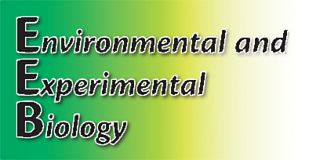
On-line: ISSN 2255–9582

| Faculty of Biology, University of Latvia | ||||||

|
Hard copy: ISSN 1691–8088
On-line: ISSN 2255–9582 Environ Exp Biol (2019) 17: 15–19
|
|||||

|
About the Journal | Retractions | Open Access | Author Guidlines | Current Issue | Archive |
|
Environmental and Experimental Biology |
Environ Exp Biol (2019) 17: 15–19 |
Tissue recalcitrance remains a major problem limiting woody plant propagation using in vitro biotechnology methods. Increased generation of reactive oxygen species and high phenol concentration in woody tissues are considered as the main reasons for tissue recalcitrance in tissue culture. In this study, oxidative enzyme activity and total phenolic concentration were analyzed in vitro in both rejuvenated and mature shoots of birch. The effect of two factors – subculture time and medium sucrose concentration – on peroxidase and polyphenol oxidase activity, and total phenolic concentration in rejuvenated shoots were determined as possible rejuvenation-affecting factors. The results showed that mature shoots had increased peroxidase and polyphenol oxidase activity in shoot apices and stems but higher phenolic concentration in leaves as compared to rejuvenated shoots. Prolonged subculture time had significant effect on peroxidase activity and polyphenol oxidase activity in shoot apices, and thus this factor did not affect maturation. However, high sucrose concentration significantly increased total phenolic concentration in leaves and polyphenol oxidase activity in all plant parts, thus enhancing shoot maturation and recalcitrance in vitro.